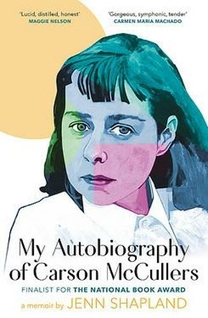

Shapland reaches back and painstakingly crafts the story McCullers was never able to tell. Many praised McCullers as an author “ahead of her time.” But as a queer woman in the mid-20th Century, she was also ahead of her time in a way that left her unable to express her own identity aloud or on paper she literally did not have the words. But sometimes, a magnificent life occurs before the language exists with which to honestly write about it. How does one person write someone else’s autobiography? It seems impossible. In the process, she builds a sense of deep empathy across generations of queerness through the power of shared experience.įrom the title alone, we know we’re in for something different. By doing so, by finally saying aloud what has been known only in the shadows, Shapland protects the evidence of McCullers’s love from total destruction. She approaches the daunting task, she says, like “a crime scene,” examining every clue she finds and telling us about them. Throughout her riveting and tender investigation into this question, Shapland travels the country chasing down letters, photographs, and objects in order to uncover the truth about the love life of an oft-overlooked titan of American fiction. “What is the precise evidence for love?” Shapland asks in her stunning, full-length nonfiction debut, My Autobiography of Carson McCullers (Tin House, Feb. Similarly, McCullers herself has been hiding in plain sight all these years, her queerness deliberately obscured or erased by her family, her biographers, and even some of her lovers for over 50 years.Įnter: Jenn Shapland, the perfect combination of lesbian, writer, and archivist to bring McCullers to life for a modern-day audience… and set the record gay. McCullers hid queer people in plain sight in all of her work, at a time when being gay could’ve gotten you arrested or accused of being a Communist sympathizer. Or maybe the gatekeepers of the literary world, who remain painfully male and heteronormative, have been uneasy with the characters themselves: lonely people longing for things they can’t quite name. McCullers’s works - The Heart is a Lonely Hunter, The Ballad of the Sad Cafe, and more - are quiet narratives that focus on internal human struggles, instead of splashy action. Perhaps it’s the nature of her stories that makes her easier to forget than others. Despite being a celebrated author during the mid-20th Century, her name often falls to the wayside when today’s literary critics talk about the American greats. Then again, there’s a good chance her name is new to you, and that’s no surprise. You might have even read one or more of her books.


If you’re a queer person today, you might have heard of the author Carson McCullers. The Autostraddle Encyclopedia of Lesbian Cinema.



 0 kommentar(er)
0 kommentar(er)
